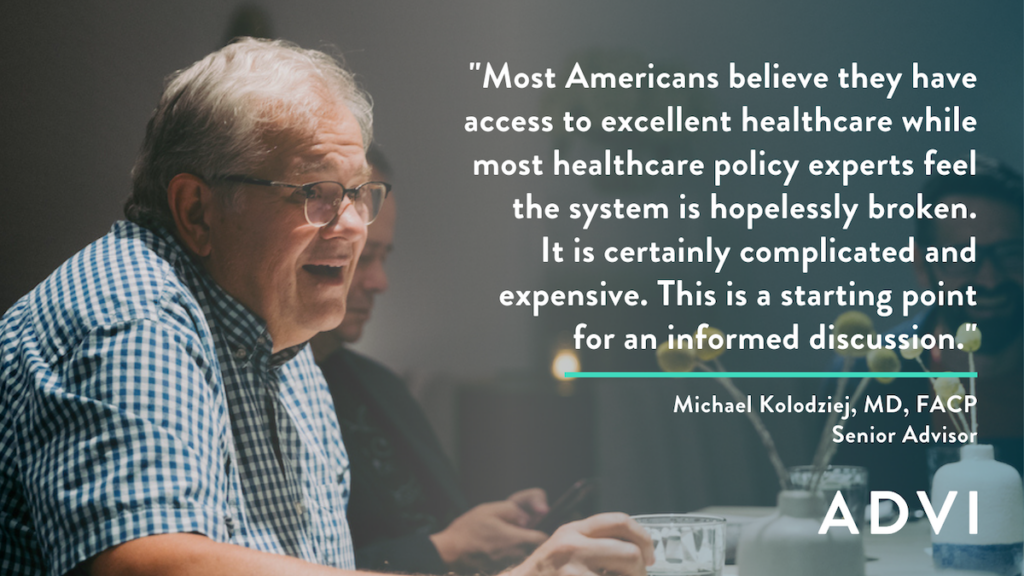Insights,
Insights,
Explore this series by ADVI Expert and senior advisor Dr. Michael Kolodziej which aims to educate as many individuals as possible on a variety of topics to better understand health delivery and payment.

Part Thirty-Five
In part thirty-five (a) and thirty-five (b) of his Decoding Health Care series, Dr. Kolodziej expands on the history of cancer and what we know, as well as how we know to best prevent it. He dives into the exposures that can put us in danger, as well as how we are doing in the ‘war against cancer.’
Part Thirty-Four
In part thirty-four (a) and thirty-four (b) of his Decoding Health Care series, Dr. Kolodziej dives into the discussion of healthcare under the current Trump administration. He shares his perspective on the nomination of RFK Jr. as HHS Secretary, NIH funding cuts, and more.
Part Thirty-Three
Prescription drugs is a hot topic that has become increasingly more discussed in recent presidential campaigns. In part thirty-three (a), thirty-three (b), and thirty-three (c), Dr. Kolodziej shares insight on Medicare drug price negotiation, pharmacy benefit managers (PBMs), and more.
Part Thirty-Two
In part thirty-two (a), part thirty-two (b), and part thirty-two (c) of his Decoding Health Care series, Dr. Kolodziej discusses the media’s affect on medicine and its influence on patient perspectives. He expands on miscommunication in media, how diagnoses often get sensationalized, and more. He also brings attention to the fact that some investigative journalism does not act as an accurate report of medical issues. Additionally, he dives into how the media impacted the world’s perception on COVID-19 during the 2020 pandemic.
Part Thirty-One
Patient trust and communication is essential when considering patient outcomes. In part thirty-one of his Decoding Health Care Series, Dr. Kolodziej discusses his personal experience gaining trust in providers, how he has learned to earn his patient’s trust, and healthy skepticism.
Part Thirty
In part thirty (a) and part thirty (b) of his Decoding Health Care Series, Dr. Kolodziej shares insight on being a patient from a provider standpoint. He expresses factors that allow patient and provider understanding, while sharing his experience discovering the difference between patient and provider perspectives. He notes the critical elements that all patients deal with, like drastic time consumption, post-operation pain management, and uncertainty.
Part Twenty-Nine
Did you know that only 25 percent of practicing physicians work in primary care? The number of primary care physicians in the US is far too low, and they aren’t distributed where we need them. In part twenty-nine of the Decoding Health Care Series, Dr. Kolodziej shares insight on the primary care shortage, as well as why many physicians are hesitant to go into primary care.
Part Twenty-Eight
In part twenty-eight (a) and part twenty-eight (b) of the Decoding Health Care Series, Dr. Kolodziej expands on the main factors of medical malpractice and medical errors. He discusses the changes that have been made over the last few decades in the healthcare industry to prevent the increase in medical errors and expands on medical malpractice lawsuits.
Part Twenty-Seven
In part twenty-seven (a) and part twenty-seven (b), Dr. Kolodziej shares that over 50% of physicians are experiencing burnout. Examples or signs of burnout can include physical and emotional exhaustion, the feeling of “compassion fatigue” (sarcasm, negative attitude, etc.), or the loss of meaning in your work. To prevent this, Dr. Kolodziej expands on common causes for burnout for physicians, and how to prevent the increase of stress. He also shares the increase of medical errors when physical burnout occurs, which often leads to medical malpractice lawsuits. Additionally, depression becomes increasingly more common, with between 15-30% of physicians experiencing it, and a suicide rate that is double that of the general population.
Part Twenty-Six
In part twenty-six (a) of the Decoding Health Care Series, Dr. Kolodziej dives into the historical foundation of American medical education in the US, rooted in the 1910 Flexner Report. He discusses the disciplinary impact of the Flexner Report as well its negative impact, like its prejudice, that we continue to experience today.
In part twenty-six (b), Dr. Kolodziej talks about the complexities of physician training and the significant role that post graduate education plays. He expands on the 1984 Libby Zion case that changed the way many perceived medical education.
In part twenty-six (c), Dr. Kolodziej discusses fellowships and board certifications. He also addresses the difficult questions that many ask when it comes to physician qualifications, like how important experience actually is, recertifications after time has lapsed since training, mandatory retirement ages for physicians, and if we need to be concerned about declining skills in senior physicians.
Part Twenty-Five
The US biomedical research system has many strengths, challenges, and opportunities for reform, as Dr. Kolodziej notes in part twenty-five of the Decoding Health Care Series. Additionally, he touches on the barriers that young people pursuing careers in basic science research face.
Part Twenty-Four
In part twenty-four of the Decoding Health Care Series, Dr. Kolodziej highlights patient advocacy groups and the vital role that they play in offering benefits like care, support, research, funding, and more. Despite these positive contributions, controversies arisen surrounding these groups in recent years.
Part Twenty-Three
Dr. Kolodziej discusses the importance of second opinions in oncology and how they can often lead to improved outcomes. In part twenty-three of the Decoding Health Care Series, he explores the challenges many patients face such as offending doctors, cost, and inconvenience.
Part Twenty-Two
In part twenty-two of the Decoding Health Care Series, Dr. Kolodziej discusses how social determinants of health impact access and quality of care in the US, and the difficulties of providing care to those without insurance. He expands on modern interventions that are making an impact to improve these health outcomes.
Part Twenty-One
Part twenty-one of Dr. Kolodziej’s Decoding Health Care series explores venture capital and private equity in health care, emphasizing it not only as a way of growth in the industry but in our society as a whole.
Part Twenty
In part twenty of the Decoding Health Care Series, Dr. Kolodziej discusses the history of end-of-life care services, such as hospice. He expands on how enhancing the quality measures of hospice programs is essential, inputting his own experience and knowledge of end-of-life services.
Part Nineteen
In part nineteen (a) and part nineteen (b) of the Decoding Health Care Series, Dr. Kolodziej highlights the evolution of targeted therapies to cancer, focusing specifically on cell and gene therapy. He expands on the history of understanding the sickle cell disease and the experimental treatments that were conducted.
Part Eighteen
In part eighteen (a) and part eighteen (b), Dr. Kolodziej discusses how cancer screenings have become a more standard and frequent practice in health prevention, and how the evolution of these screenings for different forms of cancer aim to diagnose early cases of illness.
Part Seventeen
In part seventeen of the Decoding Health Care Series, Dr. Kolodziej highlights precision medicine, kicking off the discussion with the example of CML (Chronic Myeloid Leukemia). Throughout its several decades of being researched, it became a paradigm of cancer causation and treatment due to the individual toll it would take on each patient. This led to a much larger conversation about the future studies of cancer mutations and DNA sequences.
Part Sixteen
In part sixteen (a) and part sixteen (b), Dr. Kolodziej analyzes the development of technology in patient and provider settings. He discusses the vast underutilization of telemedicine in the past, and expands on how COVID-19 upended healthcare practices in America as we knew it, how we have learned to adapt to technology alternatives like telemedicine, and how we have incorporated technology into everyday tasks since.
Part Fifteen
In part fifteen, Dr. Kolodziej reflects on the ways that clinical research and clinical trials have attributed to advanced medical knowledge, playing a significant role in cancer drug trials, pharma funded trials, the FDA approval process, and more.
Part Fourteen
Part fourteen of the Decoding Health Series highlights the real world evidence needed to answer medical questions with the help of big data, clinical research, and technology developments in health care that reassure the accuracy and consistency of medical documentation.
Part Thirteen
In part thirteen of the Decoding Health Series, Dr. Michael Kolodziej discusses the importance of measuring quality in healthcare and the challenges associated with it, particularly in oncology and within the context of reimbursement models like MIPS.
Part Twelve
In this two-part series – part twelve (a) and part twelve (b) of the Decoding Health Series, Dr. Michael Kolodziej discusses the importance of evidence-based clinical decision-making in oncology and the role of organizations like the National Comprehensive Cancer Network (NCCN) in providing clinical guidelines. He also dives into the implementation and impact of clinical pathways in oncology, focusing on efforts to standardize treatment options based on efficacy, toxicity, and cost, ultimately aiming to improve patient care, reduce costs, and address challenges in the rapidly evolving landscape of medical knowledge and practice.
Part Eleven
Part eleven of the Decoding Health Series focuses on the evolution of the patient-centered medical home (PCMH) model, initially developed for children with special healthcare needs, and its application to various medical specialties, including oncology. Dr. Kolodzieh discusses the model’s effectiveness and suggests modifications to improve sustainability and patient outcomes.
Part Ten
In part ten, Dr. Kolodziej traces the FDA’s historical evolution from its inception to its modern-day role, particularly focusing on pivotal moments during landmark drug approval processes and its challenges with surrogate endpoints. He emphasizes the importance of post-approval data submission, discusses the need for collaboration between the FDA and other agencies for outcomes-based contracts, and highlights areas for potential improvement in FDA regulation.
Part Nine
In part nine, Dr. Kolodziej reflects on his previous posts critiquing the pharmaceutical industry, the US healthcare shortcomings, Medicare, Medicaid, physician compensation, and more, ultimately expressing skepticism towards the Medicare for all proposal and transitioning focus towards discussions on healthcare delivery and reception.
Part Eight
In part eight, Dr. Kolodziej discusses the complexities of physician compensation in the US, highlighting the disparities in pay among different medical specialties and the influence of factors such as reimbursement systems, entrepreneurial opportunities, and drug pricing.
Part Seven
In this two-part series – part seven(a) and part seven(b), Dr. Kolodziej focuses on the pharmaceutical industry. He explores the roots of drug pricing, from the groundbreaking Hatch Waxman Act to the modern landscape shaped by generic drugs, middlemen complexities, and biologics, which reveals the intricate web influencing medication affordability, availability, and access.
Part Six
In this two-part series – part six(a) and part six(b), Dr. Kolodziej discusses the challenges and distrust surrounding health insurance companies. He traces their historical evolution while emphasizing the impact of benefit designs, premiums, and cost-sharing on individuals’ healthcare decisions.
Part Five
In part five, Dr. Kolodziej focuses on the history of hospitals and their role in increasing healthcare costs.
Part Four
In part four, Dr. Kolodziej discusses the Affordable Care Act (ACA) and its impact on healthcare in the United States as well as the challenges and benefits of Medicaid.
Part Three
In part three, Dr. Kolodziej covers Medicare in its current formulation, breaking down its history and laying out the basics of Medicare Parts A, B, C, and D.
Part Two
In part two, Dr. Kolodziej outlines the background and history of employer-sponsored health insurance, detailing the challenges we face due to the current employer and payer landscape.
Part One
In part one, Dr. Kolodziej shares his perspective in a broad overview of “How we pay for it and how we can improve it”.
Learn More
Stay ahead of the curve as you look toward 2024. Get in touch today to gain expert insights and strategic counsel on the evolving healthcare landscape.


Senior Advisor